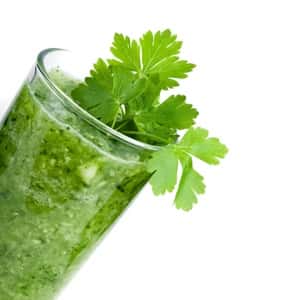
Whenever you start doing something different because it is supposed to be good for your health, it makes sense to check out the possible consequences. Sometimes people find that the cure is worse than the disease. That is what this reader discovered, through her husband’s experience:
Q. I recently found out that something that could be great for you might also end up causing problems. My husband was drinking a daily green juice comprised mainly of parsley and kale for many months. He got hit with kidney stones. It turns out that parsley, kale and beets are very high in oxalates, which contribute to kidney stone formation.
A. Juicing is a way to consume concentrated amounts of nutrients easily. As you point out, this could be helpful in some cases. On the other hand, people juicing foods rich in oxalates such as parsley, beets with greens, collard greens and spinach could easily overdo. This is particularly true for anyone who has already experienced a kidney stone, as they are at higher risk for another.
The Hazards of Green Juice
A case report from the Mayo Clinic describes an 81-year-old whose kidney function dropped suddenly after he began juicing all his meals in an attempt to lose weight (American Journal of Medicine, Sept., 2013).
It isn’t only people trying to lose weight who have taken up juicing. Others are simply trying to maximize their nutritional intake of green vegetables, with all their magnesium, potassium, folic acid, vitamin C and other helpful ingredients.
Controlling Blood Pressure
Some folks want to lower their blood pressure with beet juice. They too should be aware of this risk, especially if they have ever had a kidney stone. Drinking green juice with beet or collard greens, kale or parsley could provide too much oxalate for their kidneys to handle.
You can learn more about beet juice and other non-drug approaches to hypertension control in our Guide to Blood Pressure Treatment.

